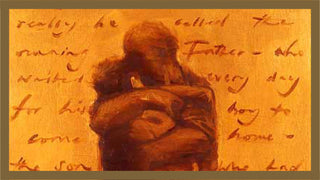As I was pondering Father’s Day, my mind turned – naturally – to Jesus’ parable in Luke 15:11-32. It’s famously known as The Prodigal Son but, let’s be honest, that title is a bit misleading. A more accurate title might be The Godly Father, The Waiting Father or even The Good Father (which has a nice ring for a Netflix docuseries). Because at the heart of this story is not the rebellion of the son, but the radical, costly love of the father.
Let’s consider three kinds of cost in this parable.
1. The Cost of Letting Go
The parable opens with the younger son marching in and saying, ‘Dad, I want my inheritance now.’ In essence: ‘You’re better off to me dead.’ It’s astonishingly offensive. In Middle Eastern culture, this would have been like punching your father in public – in front of the whole village – then demanding cab fare.
And what does the father do? He lets him go.
The estate – ancestral land passed down through generations – has to be divided and liquidated. That would’ve been like a family selling off the farm, the business and the house all in one go, so that the youngest can blow it all on what the Bible calls ‘wild living’.
Culturally, he should have refused. Any father worth his beard would’ve taken the lad aside and said, ‘You’re not thinking straight, son. Sit down, have a kebab, let’s talk about this.’ Instead, the father absorbs the insult. He says yes. And in doing so, becomes the talk of the town – but not in a good way.
There’s a quiet pain here that every parent knows. Sometimes, loving someone means letting them go, even when you know they’re heading straight into a disaster of their own design.
God the Father did this with Adam and Eve. He gave them freedom, knowing they might use it foolishly. He does the same with us.
2. The Cost of Welcoming Back
The son returns, filthy and famished, rehearsing his apology like a man auditioning for forgiveness. And the father? He doesn’t even let him finish. He runs to him – something no dignified man of the time would do. Imagine an elderly Jewish patriarch lifting his robes and sprinting through town in sandals. That’s what Jesus describes.
The embrace is not cautious; it’s extravagant. Robe, ring, and roast beef on the table. The fatted calf gets it! The son who effectively declared, ‘You’re dead to me,’ is now celebrated with music and dancing. It’s scandalous grace.
Let’s be real: many in the village would have been disgusted. ‘He’s rewarding rebellion!’ they’d whisper. ‘Weakness dressed up as love!’ But the father doesn’t care about appearances; he cares about reconciliation with his son.
God welcomes us back the same way. No lecture. No probation period. Just open arms and a party. That’s grace.
And here’s the kicker: grace costs. The father in the story absorbs the shame. And our heavenly Father absorbed the ultimate shame – on the cross. Dignity traded for deliverance.
3. The Cost of Celebrating
It’s not just that the father lets the son come home. He throws a party so loud it wakes the neighbours . . . and enrages the elder brother. ‘He doesn’t deserve this!’ the older son fumes. ‘I’ve been loyal and got nothing!’
Now, most of us can sympathise with the elder brother. Let’s face it, he’s every sibling who ever said, ‘How come he gets cake? He’s the one who set the garden shed on fire!’
But the father’s response is key: ‘You’ve always been with me. But this son of mine was dead and is alive again!’
It’s a challenge to us all. When people repent, do we celebrate . . . or sulk? Are we more obsessed with fairness than forgiveness? Heaven isn’t concerned with merit badges; it’s concerned with mercy.
Fathering is Costly
This Father’s Day, if you’re a father, grandfather, godfather or father-figure, you are carrying a great and sacred calling. It may not come with applause or hashtags but heaven takes notice. You are modelling the heart of God every time you show grace, speak truth, forgive freely, or even when you say, ‘We’re not lost, I just took the scenic route.’
Fatherhood is costly, both emotionally and spiritually. It requires wisdom, patience, sacrifice – and sometimes the willingness to be misunderstood.
But it is worth it.
And if you’re not a father . . . well, you have one. Maybe you remember him fondly. Maybe the relationship was fractured or absent. But here’s the invitation of the parable: to see in the story not just your earthly father, but your heavenly one. The one who runs to meet you. Who bears the cost. Who throws the party.
And just maybe – if that’s the love we’ve received – it’s the kind of love we’re called to give back. Grace, after all, works both ways.
A Father’s Day Prayer
Loving Father, we thank you for the gift and calling of fatherhood.
For fathers who reflect your kindness, strength and joy, we give you praise.
For those who find this day hard – through loss, pain or absence – may your comfort be near.
Help all fathers and father-figures to walk in wisdom, lead with love and be men after your own heart.
And for all of us – children of earthly dads – help us to show grace, just as we have received it.
In the name of the Son who told us this story, amen.
J.John




